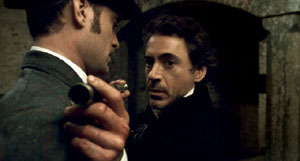 The trailers for Guy Ritchie’s latest film, titled simply enough, Sherlock Holmes, depict late Victorian England as a cartoonish landscape in which weak witticisms are uttered amidst kinetic fisticuffs and spectacular explosions. The film appears to be the spiritual successor to The League of Extraordinary Gentlemen, threatening another atrocious abomination of sacred source material. Fortunately, the trailers only tell half the story of Sherlock Holmes, a film that combines the spirit of Sir Arthur Conan Doyle’s miscreant detective with Ritchie’s best work about London’s criminal and misanthropic underbelly.
The trailers for Guy Ritchie’s latest film, titled simply enough, Sherlock Holmes, depict late Victorian England as a cartoonish landscape in which weak witticisms are uttered amidst kinetic fisticuffs and spectacular explosions. The film appears to be the spiritual successor to The League of Extraordinary Gentlemen, threatening another atrocious abomination of sacred source material. Fortunately, the trailers only tell half the story of Sherlock Holmes, a film that combines the spirit of Sir Arthur Conan Doyle’s miscreant detective with Ritchie’s best work about London’s criminal and misanthropic underbelly.
The film opens with Holmes and his partner Dr. Watson (Law) interrupting a ritual sacrifice by a secret society of darkly cloaked figures. Classic Victorian intrigue is afoot! Holmes’ exceptional detection and observation skills are immediately put on display as we see first his point by point planning of how to disarm a guard and then his perfect execution of said plan. The technique is effective and not overused, just enough to establish that Holmes’ skill set is not limited solely to solving crimes but can also be used to kick a less observant man’s ass.
Elsewhere, however, Holmes is a mess. Downey draws divine (nay, experiential) inspiration portraying a Sherlock Holmes whose methodical mind is its own detriment when not set to sleuthing. When the man caught at the sacrifice, the obvious “capital-V” Villain Lord Blackwood seemingly returns from the dead, Holmes’ frustration is overshadowed by his relief to be back on the case.
Mystery fans won’t be disappointed as nearly every scene of Sherlock Holmes involves a clue to the overall mystery. Mini mysteries within the main mystery (mysteries abound!) are solved in inventive yet accessible ways, often answering questions while raising new ones until the final “parlour room” reveal. Along the way, Downey (doing a rather convincing accent) elevates the film to a higher level of entertainment as a flawed yet superior intellect who Jude Law’s Watson tolerates amiably enough. Rachel McAdams does a decent job as Holmes’ cunning female counterpoint and the only person ever to best him.
Ritchie’s direction pulls everything together, toning down the tendency to constantly show off his camera work, making for a brisk flowing story that moves nearly seamlessly from extravagant action/adventure set-pieces to darkly detailed environments where almost anything could provide a clue. As you may have deduced, Sherlock Holmes is quality holiday entertainment. Here’s hoping for a sequel in which Prof. Moriarty gets his dues.













